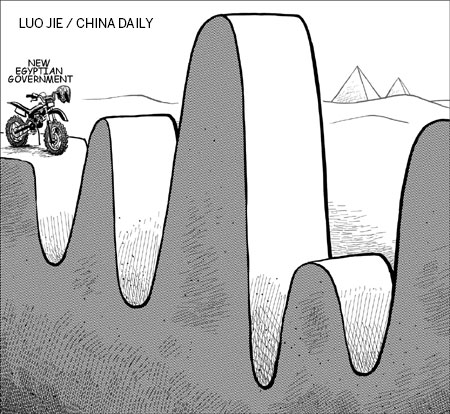
The presidential election in Egypt on May 23 and 24, the first since the resignation of Mohamed Hosni Mubarak in February last year, has attracted widespread attention as the result will determine the country's future direction after the "Arab Spring".
The intervention of the West has caused different results for different countries: in the Middle East, certain monarch states survived the crisis, but some countries such as Tunisia and Egypt witnessed regime change and were incorporated into the US' "Greater Middle East Plan". Actually, Western countries used the word "catastrophic" to describe their "success" in Libya, and I think the same term can be applied to Egypt.
After the overthrow of Mubarak, it is Muslim forces that have risen to power in Egypt. The past year has witnessed the rise of several Islamic political parties after decades of suppression. The Freedom and Justice Party, organized by the Muslim Brotherhood, emerged as the biggest winner in the recent parliamentary elections, winning 235, or 47.2 percent, of the seats in the People's Assembly. The ultra-conservative Nour party won 24.3 percent of the seats and the New Wafd Party 7.6 percent.
The non-Islamic parties are alert to the growing Muslim forces, which might cast a negative influence on one of the most promising candidates Abu Al Fotouh who resigned from the Muslim Brotherhood when he decided to run for president, and Amr Musa, who was foreign minister under Mubarak.
Therefore it is still difficult to predict which one of the 13 candidates will be elected as the new president. But one thing is certain: whoever wins will face many problems and challenges.
The fall of Mubarak, the former president who ruled Egypt for 30 years, reflected the deficiencies in Egypt's political system and economy.
Although the foreign reserve was up slightly in April, it had fallen from $36 billion to less than $15 billion in the 2011 fiscal year, while domestic debt reached $166.5 billion and foreign debt $34.9 billion. Meanwhile, the economic losses resulting from the political upheaval are expected to be over $70 billion. To make matters worse, tourism withered due to the instability and unemployment has risen.
So the new president and his government must address the following issues:
The first priority is to restore social order and stability, so that the people, especially the young, have hope for the future. Coordinating among the various parties and races, especially between Islamic and non-Islamic forces, giving up religious extremism are essential for a new state identity. Egypt must promote democracy in a stable, peaceful way and start nation building with the rule of law.
Preventing the wealth gap from further widening, and promoting economic growth, so as to improve people's well-being is also essential.
How the new president deals with these will decide whether Egypt can write a glorious new chapter in its history.
The new Egyptian government is expected to be more independent, but it will not seek to challenge Western influence in the region, it will cooperate with other Arab countries. In other words, the US will play a dominant role in the region, but it will not get to dictate everything.
In December, Egyptian security forces and police searched the offices of 17 "civil society organizations" in the country, including the US-based International Republican Institute and National Democratic Institute. The official news agency said they had been targeted as part of an investigation into the foreign funding of such groups.
"The public prosecutor has searched 17 civil society organizations, local and foreign, as part of the foreign funding case," MENA reported the Egyptian prosecutor's office as saying.
Egypt needs more friends and partners in seeking its own interests, so I am optimistic about Egypt's relations with China in the long run. Let's hope the two countries will strengthen their friendship.
The author is a researcher on Middle East and North African studies at the Chinese Academy of Social Sciences.
(China Daily 05/23/2012 page9)